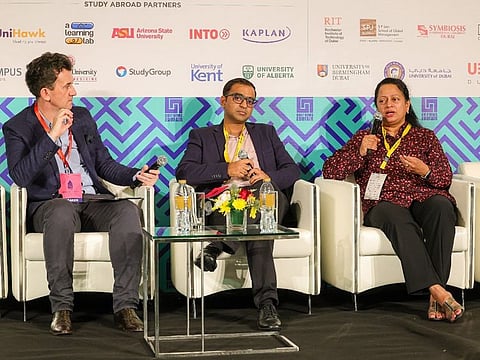Gulf News Edufair 2024: Educators who use AI will replace those who don’t
Experts discuss how AI is shaping education during a session at Gulf News Edufair 2024

The integration of AI into education promotes personalised learning and critical thinking but it wouldn’t replace human educators, said experts during a panel discussion on AI Chatbots in Education – Smart Tools or Just a Distraction on the first day of the October edition of Gulf News Edufair 2024. Tarun Gangwar, COO of Tetr College of Business, and Dr Sujala D. Shetty, Associate Professor and Head of Computer Science at BITS Pilani Dubai, emphasised that human connection, empathy and trust are irreplaceable in education.
What AI can definitely do is tailor educational content to meet the individual needs of students in ways educators cannot. “It's impossible to use 60 different examples for 60 different students in a class, but a AI chatbot can teach the concept of ROI to a product manager and it can use a very different context to somebody who aspires to be in marketing,” explained Gangwar.
Acknowledging the capability of chatbots to adapt to students’ varying levels of understanding and cater to them, Dr Shetty highlighted the need for a shift in mindset in both faculty and students to harness AI tools effectively. “If you look at a syntax of a programming language, be it Java or Python, it is impossible for a student to remember everything. So we tell students to make it a habit to refer to online resources so that they have the ability to use something that is already there and quickly come up with solutions for problems. Even professional coders will always have a Co Pilot to help them with recommendations. It's not about regenerating the same code over and over again, but using them in an optimal manner.”
Fears of AI chatbots replacing traditional methods of teaching critical thinking and problem-solving are misplaced, said Gangwar. If anything, AI empowers critical thinking by providing easy access to information, allowing students to focus on processing and forming opinions.
“It's like having a very intellectual brainstorming partner who’s more informed than you. And now you are able to process that information, reflect on it, and form an opinion, which is not what AI can do for you,” he said. “This actually enhances your ability to think critically.”
However, foundational knowledge and the ability to judge and evaluate information are critical for students, said Dr Shetty, striking a note of caution against relying too heavily on AI. “Many of the large language models tend to hallucinate - if they don't really have data about something they could produce something fictional, imaginary. So issues such as hallucinations and bias are grave concerns.”
While training programmes and support frameworks are necessary to ensure both faculty and students can effectively use AI tools, panellists agreed that it was imperative to balance AI tools with traditional education to maintain academic integrity and that educators are here to stay.
“The job of an educator is not to just give information, ask questions or give assignments,” said Gangwar. “The role has a lot more to do with giving students support, motivation and guidance. It’s about human connection, empathy and trust. I don't think AI will take away the job of educators - educators who use AI will replace the ones who don't.”







